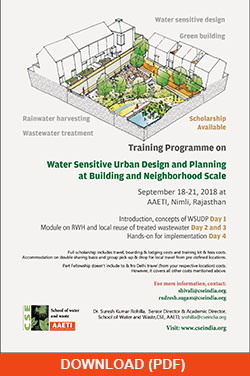Training on Water Sensitive Urban Design and Planning at Building and Neighborhood Scale
Anil Agarwal Environment Training Institute (AAETI) Registration now closed
Nimli, Rajasthan (301405) Limited Partial/Full Scholarships available.
Background
 |
Water problems jeopardise the survival of millions of people in urban India. Rapid and unregulated growth of towns and cities is a key reason for unsustainable water management. The current water model primarily focuses on supply side management and emphasize on the energy as well as resource intensive centralised urban water management. The increasing demand–supply gap and deteriorating environmental conditions are increasing the need for environment friendly alternatives. It is important to take up the challenge in controlling and judiciously using natural resources to reduce our ecological footprint. This can be done by using water-sensitive urban design and planning (WSUDP) approach which integrates the urban water cycle, water supply, wastewater, stormwater and groundwater management. This approach contributes to sustainability and livability, particularly when considered part of an overall urban strategy. The training also covers the water–energy nexus (Watergy) approach for managing water and energy resources in an integrated manner. Recognising the importance of WSUDP at local level, School of Water and Waste, Centre for Science and Environment (CSE) is organizing a four day training programme on “Water Sensitive Urban Design and Planning” (WSUDP). This training will focus on the components of WSUDP – designing Rainwater Harvesting (RWH) systems, Sustainable Urban
Drainage System (SUDS) and Wastewater treatment, recycle and reuse using Decentralized Waste Water Treatment system (DWWTs) at neighborhood and building scale.
Aim:
The aim of the training is to mainstream decentralised WSUDP through capacity building of practitioners involved in planning and management of urban infrastructure.
Objectives:
- Developing community of practice in WSUDP sector
- Exposure and use of key tools and approaches for existing and upcoming policies, programmes and projects
- To generate awareness about BMPs, state of art knowledge in the area of WSUDP
Program Design: September 17-20, 2018
The training programme will follow a mix method approach involving lectures, in-class exercises, interactive discussions and audio-video training support. The participants will get the opportunity to plan and design water sensitive urban systems including RWH and DWWTsas part of ‘Do It Yourself ‘- group exercise. It will also include field visit to showcase relevant water sensitive features in a building.
Day 1: Concepts of green buildings, watergy and WSUDP
This module will focus on the essential elements of green buildings with reference to latest design and guidance documents. Measures to reduce energy consumption within a building and neighbourhood, with specific emphasis on water management related energy savings would be discussed in detail. There would be dedicated sessions providing overview of the aim, benefits and the components of WSUDP for any new developments and redevelopments.
Day 2 and 3:SUDS, RWH and local reuse of treated wastewater
This module will start with introduction to diverse interventions and new urban design processes aligned to storm water management at different scales. This will be followed by urban RWH and the potential it holds in augmentation of water resources by using public spaces to recharge local groundwater resources and local storage. This will also focus on the wastewater component of WSUDP and local reuse of treated wastewater using decentralized wastewater treatment (DWWT) systems. This module will impart skills on planning anddesigning of water sensitive structures, their techno-economic feasibility, operation and maintenance measures etc.
Day 4: Hands-on exercises for planning and designing
This module will focus on imparting hands-on skills for planning and designing of WSUDP structures. This will showcase examples of best management practices (BMPs) and provide platform for do-it-yourself exercises in groups for planning and designing with case examples at neighborhood and building scale.
Full fellowship includes travel, boarding & lodging costs and training kit & fees costs. Part Fellowship includes boarding & lodging costs and training kit & fees costs.
Note: Only shortlisted candidates will be informed.
How to Apply:
Registration now closed
Course Coordinators:
Shivali Jainer
Deputy Programme Manager, Water Programme
+91-11-40616000 (Ext: 244)
Email: Shivali@cseindia.org
Sugeet Grover
Senior Research Associate
Sustainable Buildings and Habitat Programme
Tel: +91 11 40616000 (ext 283)
Email: sugeet.grover@cseindia.org
Rudresh Kumar Sugam
Senior Programme Manager, Water Programme
+91-11-40616000 (Ext: 389),
Email: rudresh.sugam@cseindia.org
Dr. Suresh Kumar Rohilla,
Senior Director & Academic Director,
(School of Water and Waste,CSE, AAETI).
srohilla@cseindia.org
| Feedback |
| “An eye opener program that meets the everyday needs of everyone without much cost. I will look forward to tap ideas from future programs.”
Mawuli Dogli, CSIR – IIR, Ghana |
| “The balance between the theoretical and practical understanding was great and well balanced.”
Tapas Bhargava, Student, School of Planning and Architecture, Bhopal |
| “This training helped me in understanding DWWT systems and I think I can directly apply any of topics/techniques covered in this course.”
Madhvi Namburi, Secretary, Indian Red Cross society Gannavaram branch, Hyderabad |
| “The learning from trainings can be directly implemented; also, trainings like this should be conducted in developing countries. I invite CSE for conducting training of Rawandian decision makers too.”
Felicien Sindikubwabo, Rainwater Harvesting Construction Technician, Rwanda Natural Resources Authority, Rwanda |
Share this article